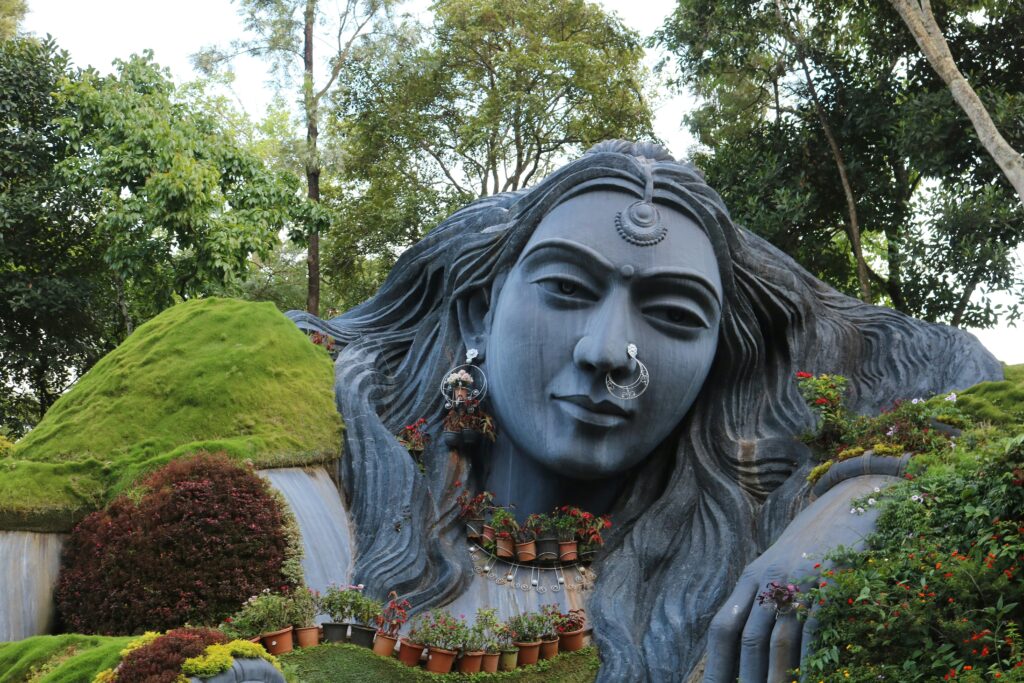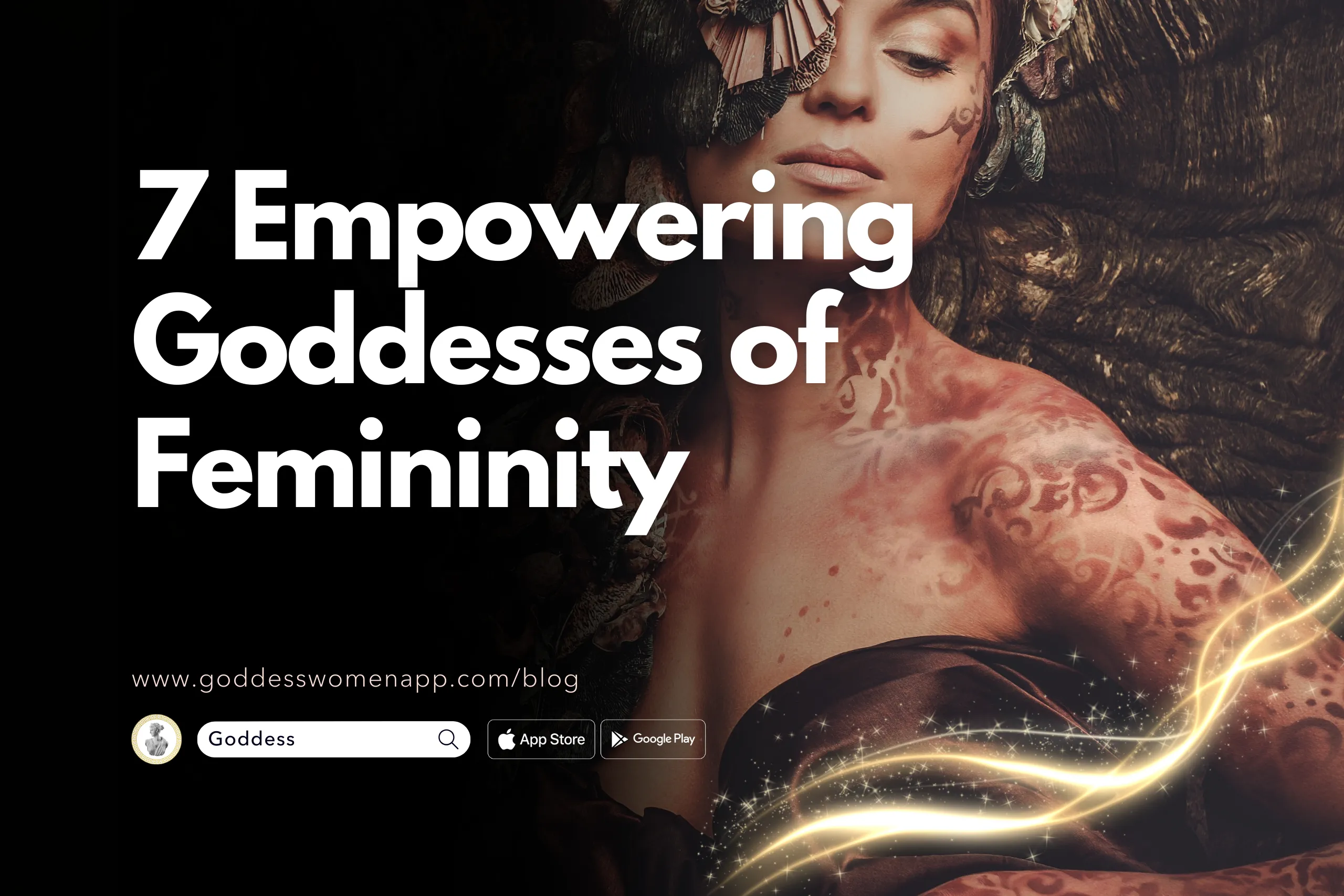Table of Contents

Introduction to Goddesses of Femininity
The concept of femininity has been revered, celebrated, and depicted in various forms throughout human history. Among the most compelling representations of femininity are the goddesses that grace the mythologies and religions of the world. These divine figures are not just symbols of beauty and grace; they embody strength, wisdom, love, and the multifaceted nature of womanhood. In exploring the “goddesses of femininity,” we delve into tales that have inspired and empowered generations, offering insights into the complexities of femininity and its enduring allure.
Goddesses of femininity stand as timeless icons, each bearing her own unique attributes and stories that resonate with the qualities of womanhood. They are worshipped, honored, and looked upon as the epitome of feminine power, embodying the essence of life, creation, destruction, love, and wisdom. This blog celebrates the strength and grace of seven such goddesses, traversing cultures and histories to uncover the depth of their influence and the lessons they impart about the essence of femininity.
As we embark on this journey through myths and legends, let us remember that the tales of these goddesses of femininity are not mere stories from the past. They continue to inspire, teaching us about resilience, compassion, and the power of embracing our true selves. Join us as we celebrate the empowering tales of these seven goddesses of femininity, showcasing the blend of strength and grace that defines womanhood across cultures and eras.
The Timeless Allure of Goddesses of Femininity
The fascination with goddesses of femininity transcends time and geography, marking a universal reverence for the divine feminine. These deities, found in the pantheons of nearly every culture, represent more than the conventional attributes of beauty and nurturing. They are complex figures, often embodying strength, wisdom, creativity, and the darker aspects of life and death. The allure of these goddesses lies in their ability to embody the full spectrum of femininity, offering a more nuanced understanding of what it means to be feminine.
In the heart of ancient civilizations, goddesses were often seen as the custodians of natural forces and societal norms. From the fertile fields of the Nile to the battlefields of the Norse, these divine women stood as pillars of influence and authority, guiding humanity through the mysteries of life. They were mothers, warriors, lovers, and scholars, each playing multiple roles that reflected the realities of the women who worshipped them.
The goddesses of femininity remind us that femininity cannot be confined to a single definition. It is fluid, powerful, and ever-changing, encompassing a range of experiences and emotions. These deities challenge the traditional boundaries of womanhood, offering a vision of femininity that is dynamic and empowering. Through their stories, we learn that femininity is not a weakness but a source of strength, wisdom, and creativity.
As we explore the tales of these goddesses, we uncover the threads of commonality that bind them. Despite their diverse origins, they share themes of creation, destruction, protection, and transformation. They navigate the complexities of existence, from the heights of love to the depths of despair, demonstrating the resilience and adaptability of the feminine spirit.
The enduring legacy of these goddesses speaks to their significance in our collective consciousness. They have shaped the way societies view femininity, offering models of empowerment and complexity that challenge simplistic narratives. In a world that often seeks to define and limit, the goddesses of femininity stand as beacons of possibility, reminding us of the power and grace inherent in the feminine.
As we move forward in our exploration, let us keep in mind the timeless allure of these goddesses. Their stories are not just relics of the past but living inspirations that continue to influence and guide us. In them, we find the courage to embrace our multifaceted nature, celebrating the strength, wisdom, and grace that define the essence of femininity.

Athena: The Goddesses of Femininity: Wisdom and Strategy
In the pantheon of goddesses embodying femininity, Athena holds a distinguished place. Unlike the traditional representations of femininity associated with beauty and fertility, Athena brings to the fore the attributes of wisdom, courage, and strategic warfare. This goddess of femininity, born from the head of Zeus fully armed and ready for battle, challenges our perceptions of feminine power, demonstrating that strength and intellect are as integral to womanhood as grace and nurturing.
Athena’s domain extends beyond the battlefield. She is revered as the patroness of the city of Athens, a goddess who bestows wisdom, promotes crafts, and champions justice. Her influence is a testament to the diverse facets of femininity; she embodies the intellectual and strategic aspects of womanhood, showcasing that femininity is not monolithic but rich and complex.
Her legends often depict Athena in roles that defy the stereotypical boundaries of gender. She guides heroes such as Odysseus with her wisdom, aids warriors with her strategic insights, and protects the city-state with her might. Yet, Athena’s femininity is never in question. It is her wisdom, her strategic acumen, and her valor that define her, illustrating that the essence of femininity encompasses a broad spectrum of qualities.
Athena’s significance as a goddess of femininity lies in her ability to embody strength without sacrificing wisdom or compassion. She represents a balance, a harmonious blend of qualities often viewed as masculine or feminine, challenging us to see beyond binary categorizations. Her stories teach us the importance of intellect, strategy, and courage in navigating the complexities of life, encouraging women to embrace these qualities as part of their feminine identity.
Moreover, Athena’s virginity is symbolic not of a lack of sexuality but of autonomy and independence. In a world where women were often defined by their relationships to men, Athena stands apart as a figure of self-sufficiency, a deity who does not derive her power from others but commands respect and authority in her own right. This aspect of her divinity speaks volumes about the empowering nature of femininity, highlighting the potential for self-definition and independence within the feminine experience.
The legacy of Athena in the realm of goddesses of femininity is profound. She challenges the conventional narratives of what it means to be feminine, offering a vision of womanhood that is powerful, wise, and autonomous. Through her, we are reminded that femininity encompasses a multitude of strengths, from the courage to face life’s battles to the wisdom to guide others and the strategic insight to navigate the challenges that lie ahead.
In celebrating Athena, we celebrate the multifaceted nature of femininity. We recognize that wisdom, strength, and strategy are as much a part of the feminine identity as beauty and nurturing. Athena’s enduring appeal as a goddess of femininity lies in her ability to inspire us to embrace the full spectrum of our qualities, encouraging women to see themselves as capable, intelligent, and powerful beings.
Her story is a beacon for those who seek to redefine femininity in their own terms, offering a model of empowerment that transcends traditional boundaries. As we reflect on the lessons of Athena, let us aspire to embody the strength, wisdom, and grace she represents, embracing the diverse and dynamic nature of femininity in all its forms.
Aphrodite: Goddesses of Femininity, Celebrating Love and Beauty
Aphrodite, the quintessential goddess of love and beauty, embodies the aspects of femininity often celebrated in poetry, art, and mythology. Her allure transcends the physical, encapsulating the essence of desire, charm, and the profound connections that bind individuals together. Unlike Athena, whose femininity is manifested through wisdom and strategy, Aphrodite represents the power of attraction and the complexities of love, showcasing another facet of the divine feminine.
Born from the sea foam, Aphrodite’s origins are as enchanting as her persona. She commands the affection of gods and mortals alike, yet her stories reveal the depth and sometimes the peril of her influence. Aphrodite’s power lies not in her physical beauty alone but in her ability to stir the hearts of those who behold her, reminding us that femininity and the powers it wields are both subtle and profound.
The goddess of femininity teaches us that love, in its many forms, is a force to be reckoned with. Through her numerous liaisons and the tales that follow, Aphrodite illustrates the joys and sorrows of love, the passion that ignites life’s greatest adventures, and the heartache that often accompanies deep affection. Her narratives are a testament to the strength required to navigate the realm of emotions, challenging the notion that qualities associated with femininity, such as emotionality and vulnerability, are weaknesses.
Aphrodite’s role extends beyond romantic love. She is a patron of unions, bringing together individuals in marriage and fostering the bonds that form communities. Her influence is seen in the arts, where she inspires creativity and beauty, and in the natural world, where her presence is felt in the blooming of flowers and the allure of spring. Aphrodite’s domain is vast, encompassing all aspects of life touched by love and beauty, reaffirming the significance of these elements in the human experience.
Yet, the goddess of femininity also embodies the complexities and contradictions of love. Her affairs often lead to conflicts among gods and mortals, illustrating the disruptive power of desire. These stories serve as reminders of the dual nature of love, capable of bringing both immense joy and profound turmoil. Aphrodite’s narratives encourage us to embrace love in all its forms, acknowledging its potential for both creation and destruction.
The worship of Aphrodite in ancient times reflects the reverence for the aspects of femininity she represents. Temples dedicated to her were places of beauty and celebration, where individuals sought her blessings for love and fertility. Her festivals were occasions for joy, emphasizing the importance of love and beauty in enriching the human experience.
In the modern context, Aphrodite’s legacy as a goddess of femininity continues to inspire. She challenges us to recognize the power of love and beauty in shaping our lives and the world around us. Her stories encourage us to embrace our desires, to seek beauty in all its forms, and to understand the strength inherent in vulnerability and emotionality.
Celebrating Aphrodite means celebrating the multifaceted nature of femininity, acknowledging that love and beauty are sources of strength and inspiration. Her tales remind us of the importance of connection, the value of aesthetics, and the transformative power of affection. As we reflect on the lessons of Aphrodite, let us aspire to cultivate love and beauty in our lives, recognizing these qualities as essential components of the divine feminine.
Aphrodite’s enduring appeal lies in her ability to embody the complexities of love and beauty, offering insights into the depth and diversity of femininity. Through her, we are reminded that the essence of womanhood is not only found in strength and wisdom but also in the capacity to love, to inspire, and to connect deeply with the world around us.

Saraswati: The Embodiment of Knowledge and Purity from Goddesses of Femininity
In the rich tapestry of goddesses that symbolize the myriad aspects of femininity, Saraswati stands out as a beacon of knowledge, creativity, and purity. This revered deity from the Hindu pantheon transcends the mere aesthetic of beauty and love, guiding us into the realms of intellect and the arts. Saraswati’s essence as a goddess of femininity is deeply intertwined with the pursuit of wisdom, the celebration of the arts, and the flow of the creative spirit, illustrating that the divine feminine encompasses the pursuit of knowledge and the elevation of the mind.
Saraswati’s depiction is serene and composed, often seated on a lotus or riding a swan, symbolizing the purity and discernment that characterizes her. She is usually shown with four hands, each holding symbolic items: a book representing knowledge, a mala (rosary) symbolizing meditation and spirituality, a water pot denoting purification, and a musical instrument (usually a veena) signifying the arts and sciences. These symbols collectively highlight the multifaceted dimensions of femininity that Saraswati embodies—wisdom, spirituality, purity, and creativity.
In mythology, Saraswati is celebrated as the source of all knowledge, music, language, and arts. She is the consort of Brahma, the creator god, suggesting that knowledge and creativity are fundamental to the act of creation itself. As a goddess of femininity, Saraswati’s narratives emphasize the importance of intellect and creativity as core aspects of the feminine identity, challenging the conventional confines that often limit the feminine to roles of nurturance and beauty.
Saraswati’s influence is palpable in the educational and cultural spheres of societies that revere her. She is invoked by students and scholars alike, seeking her blessings for academic success and wisdom. Her festivals, such as Saraswati Puja, are occasions for celebrating knowledge and the arts, where books and musical instruments are worshipped in her honor. These practices underscore the value placed on learning and creativity, affirming Saraswati’s role in fostering intellectual growth and artistic expression.
The goddess of femininity teaches us that purity is not merely an attribute of the physical but is deeply associated with the clarity of thought and the pursuit of truth. Saraswati’s association with rivers, often considered purifiers in Hindu culture, symbolizes the cleansing power of knowledge and the refreshing nature of creativity. It reminds us that the quest for understanding and the expression of creativity are vital to the human spirit, offering pathways to purification and transcendence.
Saraswati’s legacy as a goddess of femininity is a testament to the empowering role of knowledge and the arts in shaping individual and collective identities. She inspires us to embrace learning, to delve into the arts, and to value the clarity and purity that come from intellectual and creative pursuits. In a world where women’s access to education and artistic expression has often been restricted, Saraswati stands as a symbol of the right to knowledge and the freedom to create, advocating for the essential role these play in the realization of the feminine potential.
Celebrating Saraswati means acknowledging the power of the mind and the spirit in the embodiment of femininity. It means recognizing that wisdom, creativity, and purity are as integral to the feminine identity as any other attribute. Through her, we are encouraged to pursue our intellectual and artistic passions, to cultivate clarity and purity in our thoughts and actions, and to recognize the profound impact of knowledge and creativity on our lives and the world.
Saraswati’s enduring influence as a goddess of femininity highlights the significance of the intellectual and creative dimensions of womanhood. She invites us to explore the vast landscapes of the mind and the spirit, urging us to recognize and celebrate the depth and diversity of the divine feminine. In doing so, we honor the essence of Saraswati, embracing the pursuit of knowledge and the joy of creativity as fundamental expressions of femininity.

Oshun: The Guardian of the Waters of Life from Goddesses of Femininity
Oshun, a revered deity in the Yoruba religion and widely celebrated in the African diaspora through traditions like Santería and Candomblé, represents a vibrant embodiment of love, fertility, and the nurturing aspects of femininity. As the goddess of rivers, she is intimately connected to the life-giving and sustaining properties of water, symbolizing the flow of life, the sweetness of love, and the depth of women’s strength and resilience. Oshun’s essence as a goddess of femininity is woven into the fabric of communal and personal well-being, showcasing the profound influence of the divine feminine on the natural world and human affairs.
Depicted as a beautiful, charming, and coquettish figure, Oshun is not only the epitome of grace and allure but also a powerful protector and healer. Her symbols—rivers, water, honey, and gold—reflect her attributes of purity, prosperity, and fecundity. Oshun’s stories are filled with tales of her compassion for humanity, her role in bringing to the world the sweet waters that nurture life, and her capacity to heal and bring joy. Through her, we see the multifaceted nature of femininity, encompassing the ability to nurture, heal, protect, and inspire.
Oshun’s significance in the pantheon of goddesses of femininity extends beyond her domain over water and fertility. She is a symbol of the power inherent in women to sustain and renew life, to heal the wounds of the heart and body, and to bring joy and beauty into the world. Her devotion to the well-being of her children and her followers illustrates the depth of the maternal instinct, while her ability to love deeply and passionately speaks to the strength of romantic and erotic love as fundamental expressions of the divine feminine.
In the rituals and celebrations dedicated to Oshun, devotees offer honey, oranges, and cinnamon—offerings that are believed to please her and earn her favor. These rituals are not merely acts of devotion but celebrations of life, love, and community, embodying Oshun’s teachings on the importance of joy, beauty, and the sustenance of relationships. The festivals in her honor are vibrant and filled with music, dance, and the colors of gold and yellow, reflecting her luminous and joyous spirit.
Oshun’s role as a mediator and diplomat among the gods highlights another crucial aspect of femininity: the power of diplomacy and negotiation. She is often invoked to resolve conflicts and to restore harmony, demonstrating the importance of wisdom, understanding, and communication in fostering peace and well-being. Through her, we learn that the feminine qualities of empathy, compassion, and negotiation are vital forces for healing divisions and building stronger communities.
As a goddess of femininity, Oshun teaches us about the importance of self-love and self-care. Her stories encourage individuals to recognize their worth, to indulge in the pleasures of life, and to nurture their own well-being and happiness. Oshun’s message is one of balance—balancing care for others with care for oneself, balancing strength with grace, and balancing the serious aspects of life with joy and celebration.
Celebrating Oshun means embracing the full spectrum of femininity—from the nurturing and protective to the sensual and creative. It means recognizing the vital role of women in sustaining life, healing wounds, and bringing joy and beauty into the world. Oshun’s enduring appeal as a goddess of femininity lies in her ability to embody the complexities of womanhood, offering a model of empowerment that is both nurturing and strong, both loving and wise.
Through Oshun, we are reminded of the transformative power of love, the sanctity of life, and the importance of water as a source of life and renewal. Her legacy invites us to celebrate the divine feminine within and around us, encouraging us to flow with grace, strength, and joy in the ever-changing river of life.

Freya: The Fierce Warrior and Lover from Goddesses of Femininity
In the Norse pantheon, Freya stands as a goddess of unparalleled complexity, embodying both the warrior’s might and the lover’s tenderness. She is one of the goddesses of femininity. As the deity of love, beauty, fertility, war, and death, Freya presents an aspect of femininity that is both nurturing and fiercely independent. Her dual role as a warrior and a lover challenges the traditional dichotomies often associated with femininity, revealing the depth and breadth of the divine feminine’s power and resilience.
Freya’s domain extends beyond the simple dichotomies of war and love. She is a formidable figure in battle, often leading the Valkyries, the choosers of the slain, across the skies. Yet, her passion and capacity for love are equally profound, as she searches endlessly for her lost husband, Odr. This juxtaposition of strength and vulnerability, of power and passion, encapsulates the multifaceted nature of femininity that Freya represents.
Worshipped for her beauty and her prowess in magic, particularly in the form of seidr, a type of Norse magic concerned with fate and prophecy, Freya’s femininity encompasses the mystical and the earthly. She navigates the realms of the living and the dead with ease, demonstrating that the divine feminine has dominion not only over life and love but also over the mysteries of death and the unseen.
Freya’s stories are replete with themes of sacrifice, desire, and independence. She possesses the Brisingamen, a necklace that symbolizes her beauty and power, which she acquires through her own cunning and determination. This act of agency underscores the value of autonomy and self-determination within the concept of femininity, challenging the notion that feminine power is derived solely from beauty or the affections of others.
As one of the goddesses of femininity, Freya teaches us the importance of embracing all aspects of our nature. She encourages us to recognize the strength in vulnerability, the power in love, and the courage in pursuing what we hold dear. Her worship involves not just admiration for her beauty or petitions for her favor in love but also respect for her as a warrior and a master of magic, highlighting the diverse ways in which the divine feminine can manifest.
Freya’s festivals and rituals often reflect her dual nature. They are celebrations of love and fertility, where her blessings are sought for romantic endeavors and fruitful unions. Yet, they also honor her as a warrior, remembering the fallen and invoking her protection. These practices remind us that femininity is not confined to passive or nurturing roles but includes the capacity for leadership, protection, and fierce independence.
Celebrating Freya means acknowledging the complexity and power of femininity. It means understanding that love and war, beauty and strength, are not opposing forces but integral aspects of the divine feminine. Freya’s enduring legacy as a goddess of femininity lies in her ability to embody these dualities, offering a vision of womanhood that is both tender and powerful, both loving and fiercely autonomous.
Through Freya, we are invited to explore the depths of our own femininity, to embrace our desires, our strengths, and our vulnerabilities. Her story encourages us to seek balance within ourselves, to pursue our passions with courage, and to stand firm in our convictions. In Freya, we find a model of femininity that is not bound by convention but is vibrant, dynamic, and full of life, challenging us to live with the same intensity and passion that she embodies.
Isis: The Queen of Magic and Motherhood from Goddesses of Femininity
Isis, one of the most revered deities of the ancient Egyptian pantheon, stands as a symbol of the ultimate mother and wife, embodying the ideals of family devotion, magical prowess, and the restoration of harmony. Her influence extends far beyond the boundaries of motherhood and magic; she is a goddess of wisdom, healing, and the cycles of life and death, embodying the profound depth and complexity of femininity.
Isis’s story is one of unwavering loyalty and love as she embarks on a quest to resurrect her husband Osiris, demonstrating her skills in magic and her determination. This narrative not only highlights her role as a devoted wife but also showcases her strength, intelligence, and resourcefulness. Isis’s journey to gather the scattered pieces of Osiris and her ability to revive him underscore her mastery over life’s mysteries and her role as a goddess of rebirth and regeneration.
Her devotion to her family extends to her son, Horus, for whom she provides protection and guidance, embodying the protective and nurturing aspects of motherhood. Isis’s relationship with Horus also symbolizes the mother-child bond and the divine protection that extends to all her followers. She is often depicted nursing Horus, an image that has resonated deeply across cultures, symbolizing the nurturing aspect of the divine feminine.
Isis’s magic is not limited to the myths surrounding Osiris’s resurrection. She is known for her healing powers and her ability to protect her followers from harm. Her magical spells and amulets were considered powerful tools for protection and healing, reflecting the belief in her ability to intervene directly in the lives of those who sought her aid. This aspect of her divinity illustrates the transformative power of the divine feminine, capable of altering the course of nature and human destiny.
The cult of Isis spread far beyond the borders of Egypt, becoming one of the most widespread religions of the ancient world. Her worship included rites and ceremonies that celebrated her mysteries, involving initiations that promised wisdom and protection. Isis’s appeal as a universal mother figure and a goddess of magic made her worship attractive to a wide audience, including women seeking a divine role model who embodied the ideals of family, protection, and spiritual power.
Celebrating Isis means recognizing the multifaceted nature of femininity, which encompasses the capacity for love, healing, protection, and the mastery of the mystical arts. Her legacy as a goddess of femininity lies in her ability to embody the roles of wife, mother, healer, and magician with grace and power, offering a vision of the divine feminine that is nurturing yet fiercely protective, wise yet accessible.
Isis’s enduring influence as a goddess of femininity invites us to explore the depths of our own capacity for love, healing, and transformation. She encourages us to embrace the protective and nurturing aspects of our nature while also seeking wisdom and mastery over the challenges we face. Through Isis, we are reminded of the strength that lies in devotion, the power of love to transcend death, and the transformative potential of the divine feminine within each of us.
In celebrating Isis, we honor the complexity and depth of femininity, acknowledging that the divine feminine encompasses not only the power to nurture and protect but also the wisdom to heal and the strength to restore harmony. Isis’s story inspires us to embrace the full spectrum of our abilities, to seek balance and harmony in our lives, and to wield our own magic in the service of love and healing.

Kuan Yin: The Compassionate Savior of the Afflicted from Goddesses of Femininity
Kuan Yin, revered in Chinese Buddhism as the Bodhisattva of Compassion, represents the epitome of mercy, kindness, and unconditional love. Her name, often translated as “The One Who Hears the Cries of the World,” embodies the essence of divine femininity dedicated to alleviating suffering and bringing comfort to those in distress. Unlike deities associated primarily with power or wisdom, Kuan Yin’s femininity is manifested through her boundless compassion and her vow to forsake Nirvana until all beings are freed from the cycle of suffering and rebirth.
Kuan Yin’s imagery and legends reflect her gentle yet powerful nature. Often depicted holding a willow branch, a symbol of flexibility and healing, and a vase containing the nectar of compassion and wisdom, she is a source of purity and peace. Her presence is a reminder that the true strength of femininity lies in the capacity to empathize, to heal, and to offer solace and guidance to those in need.
The transformation of Kuan Yin from her male origins as Avalokiteshvara in Indian Buddhism to a predominantly female figure in Chinese Buddhism highlights the universal need for a compassionate savior who embodies the nurturing and healing qualities often associated with the divine feminine. This evolution in her representation signifies the recognition of compassion as a fundamental aspect of femininity, transcending cultural and gender boundaries.
Kuan Yin’s stories are filled with tales of her miraculous interventions to save her followers from harm and suffering. Whether it is shielding a believer from execution, quelling disasters, or healing the sick, Kuan Yin’s acts of compassion are manifestations of her vow to assist all beings in achieving liberation from suffering. These narratives not only illustrate her boundless mercy but also inspire followers to cultivate compassion and kindness in their own lives.
The worship of Kuan Yin involves prayers, offerings, and rituals that seek her guidance and protection. Devotees turn to her in times of trouble, sorrow, or illness, confident in her ability to understand their suffering and to offer relief. The widespread devotion to Kuan Yin across Asia and beyond is a testament to the deep human longing for a divine presence that offers unconditional love and compassion.
Celebrating Kuan Yin means embracing the qualities of empathy, kindness, and compassion as central to the concept of femininity. It means acknowledging that the strength of womanhood lies not only in the ability to protect or to create but also in the capacity to heal, to understand, and to love without conditions. Kuan Yin’s legacy as a goddess of femininity is her demonstration that compassion is a powerful force for change, capable of transforming lives and bringing hope to the darkest of places.
Kuan Yin’s enduring appeal as a goddess of femininity lies in her ability to embody the compassionate and nurturing aspects of the divine feminine, offering a model of empathy and kindness that transcends gender and cultural differences. Through her, we are reminded of the importance of compassion in our lives, inspiring us to listen to the cries of the world and to respond with love and understanding.
In celebrating Kuan Yin, we honor the divine feminine’s capacity for compassion, recognizing it as a vital force for healing and transformation in the world. Her story encourages us to cultivate a heart of compassion, to extend our love and kindness to all beings, and to embody the virtues of empathy and mercy in our journey through life. Through Kuan Yin, the divine feminine calls us to embrace our shared humanity, to alleviate suffering wherever we find it, and to live our lives as a testament to the power of unconditional love.

The Enduring Legacy of Goddesses of Femininity
The exploration of the goddesses of femininity—Athena, Aphrodite, Saraswati, Oshun, Freya, Isis, and Kuan Yin—reveals the rich tapestry of attributes and virtues that the divine feminine embodies. Each goddess, with her unique stories and characteristics, highlights a different aspect of femininity, from wisdom and beauty to compassion and strength. Their enduring legacy in cultures around the world underscores the universal reverence for the multifaceted nature of womanhood and the divine.
These goddesses teach us that femininity cannot be confined to narrow definitions or roles. Instead, it is a dynamic and powerful force that encompasses a broad spectrum of attributes, including strength, wisdom, creativity, love, compassion, and resilience. The stories of these deities challenge traditional perceptions of femininity, offering instead a vision of the divine feminine as a source of power, inspiration, and transformation.
The goddesses of femininity also remind us of the common threads that connect different cultures and traditions. Despite their diverse origins, these goddesses share themes of creation, protection, healing, and empowerment, reflecting the universal values and aspirations that the divine feminine represents. Their worship and reverence across cultures and epochs speak to the deep human need for figures that embody the ideals of femininity, serving as sources of guidance, inspiration, and comfort.
Celebrating the goddesses of femininity means recognizing the complexity and diversity of feminine attributes and honoring the contributions of women in all spheres of life. It is an acknowledgment of the power of the divine feminine to inspire change, to nurture life, and to bring about healing and harmony in the world. The legacy of these goddesses encourages us to embrace the full spectrum of our own femininity, to recognize the strength and beauty within ourselves, and to value the contributions of women throughout history and in our contemporary world.
The goddesses of femininity offer us a rich source of inspiration and wisdom, inviting us to explore the depths of our own nature and to recognize the divine feminine within each of us. They challenge us to break free from limiting stereotypes and to celebrate the strength, wisdom, compassion, and creativity that define the essence of womanhood.
In conclusion, the goddesses of femininity, with their empowering tales, continue to illuminate the path for those seeking to understand and embrace the diverse expressions of femininity. Their stories are not just relics of the past but living inspirations that guide us toward a deeper appreciation of the complexity and power of the divine feminine. As we reflect on their enduring legacy, let us aspire to embody the virtues they represent, honoring the divine feminine’s transformative power in our lives and in the world.
In celebrating the goddesses of femininity, we celebrate the strength, grace, and diversity of womanhood, recognizing the invaluable role of the divine feminine in shaping our understanding of ourselves and our place in the cosmos. Their stories, woven into the fabric of human culture, continue to inspire and empower, reminding us of the enduring power and beauty of the divine feminine.
Conclusion
In delving into the lives and legacies of these goddesses of femininity—Athena, Aphrodite, Saraswati, Oshun, Freya, Isis, and Kuan Yin—we uncover a profound and universal reverence for the multifaceted nature of the divine feminine. Each goddess, through her unique narrative and attributes, enriches our understanding of femininity, revealing it to be a complex amalgamation of strength, wisdom, creativity, compassion, and resilience. Their tales transcend time and culture, offering timeless insights into the essence of womanhood and the divine.
The exploration of these goddesses underscores the notion that femininity is not a monolith but a spectrum of diverse and powerful attributes. It challenges us to move beyond conventional stereotypes and to embrace a broader, more inclusive understanding of what it means to be feminine. The goddesses of femininity teach us about the strength found in nurturing and love, the wisdom in creation and destruction, and the power of healing and compassion. They remind us that femininity is a source of profound power and inspiration, capable of shaping destinies and altering the course of history.
This journey through the divine feminine also highlights the importance of storytelling in shaping our perceptions and values. The stories of these goddesses are not mere myths but are rich sources of wisdom and guidance, reflecting the struggles, joys, and aspirations of humanity. They offer solace, inspiration, and a sense of connection to the divine, encouraging us to find beauty in our complexities and strength in our vulnerabilities.
As we conclude this exploration, let us carry forward the lessons of the goddesses of femininity. Let us aspire to embody their virtues in our lives, to celebrate the diversity and strength of femininity in all its forms, and to honor the contributions of women across time and space. The legacy of these goddesses invites us to embrace our own power and potential, to nurture compassion and creativity within ourselves, and to contribute to a world where the divine feminine is recognized and revered.
In celebrating the goddesses of femininity, we not only pay homage to these divine figures but also affirm the value of femininity as a vital force in the world. Their stories, woven into the fabric of human experience, continue to inspire and empower, challenging us to envision a future that honors the depth, power, and beauty of the divine feminine.
Let us move forward with the wisdom of Saraswati, the compassion of Kuan Yin, the strength of Athena, the love of Aphrodite, the nurturing spirit of Oshun, the resilience of Freya, and the healing touch of Isis. In doing so, we pay tribute to the enduring legacy of the goddesses of femininity, embracing the transformative power of the divine feminine in our journey toward a more inclusive, compassionate, and vibrant world.
Are you ready to discover the goddess archetypes that dwell within you? Download the Goddess App today and embark on a journey of self-discovery, empowerment, and connection with the divine feminine. Take the archetype test and uncover the unique blend of goddess energies that illuminate your path to personal growth and spiritual fulfillment.





